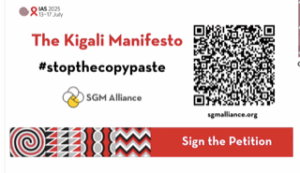IAS 2025: The Kigali Manifesto on the inclusion of people living with HIV in clinical research
31 July 2025. Related: Conference reports, Treatment access, Coinfections and complications, Cancer and HIV, Activism & advocacy, Research studies, IAS 13th Kigali 2025.

Simon Collins, HIV i-Base
 The importance of routinely including people living with HIV in a diverse range of clinical research, including for cancer, was included at IAS 2025.
The importance of routinely including people living with HIV in a diverse range of clinical research, including for cancer, was included at IAS 2025.
This included the launch of a sign-on campaign called The Kigali Manifesto on the Inclusion of People Living with HIV in Clinical Research. The document draws attention to how frequently HIV still remains an exclusion criteria for many studies relating to cancer and other complications. [1]
The document was produced by the US organisation Sexual and Gender Minorities Alliance and introduced by Gilo Kiledjian from SGM in an IAS symposium on trial design.
A related talk on access to investigational cancer treatments was given by Thomas Odeny from Washington School of Medicine in St Louis in the same symposium. This included a discussion on the higher risk of cancer-specific mortality in people living with HIV compared to without HIV, independently of the cancer stage and treatment. [2]
The talk emphasised the importance of access to the latest investigational treatments, including immune checkpoint inhibitors (ICIs), which are essential for treating advanced cancers that particularly affect people living with HIV. Importantly, ICIs are just as safe and effective in people living with HIV who are on effective ART with a CD4 count >100 cells/mm3 – yet none of the registrational studies for ICIs included people living with HIV.
This presentation also challenged the current FDA and ASCO guidelines (which were published to include people living with HIV) for including a minimum CD4 threshold of 350 cells/mm3, given that CD4 counts are often lower than this irrespective of HIV status due to previous cancer treatments.
A related study reported that 75% of cancer studies in the last five years have routinely excluded people living with HIV. [3, 4]
This is a separate sign-on to the Kigali Call to Action which was circulated before and during IAS 2025 as a call on world leaders to recognise the importance of continuing to fund HIV treatment and prevention. [4]
References
- Sexual and Gender Minority Alliance (SGM Alliance). The Kigali Manifesto on the Inclusion of People Living with HIV in Clinical Research. IAS 2025. Symposium talk. Rethinking approaches to clinical studies.
https://sgmalliance.org/people-living-with-hiv-petition-kigali-manifesto/ (website)
https://agenciaaids.com.br/dashboard/wp-content/uploads/2025/07/SGM-Alliance-Kigali-Manifesto-.pdf (PDF)
https://conference.ias2025.org/media-1258-rethinking-approaches-to-clinical-studies (webinar with login) - Odeny T. Expanding clinical trial options for cancer in people living with HIV. IAS 2025. Symposium talk. Rethinking approaches to clinical studies.
https://conference.ias2025.org/media-1258-rethinking-approaches-to-clinical-studies (webinar with login) - People living with HIV still excluded from 75% of pivotal cancer studies. HTB 27 July 2025.
https://i-base.info/htb/52017 - Leone AG et al. Inclusion of People Living with HIV in FDA Oncology Pivotal Trials from 2020-24. American Society of Clinical Oncology (ASCO), 30 May – 3 June 2025, Chicago. Abstract 1517.
https://ascopubs.org/doi/10.1200/JCO.2025.43.16_suppl.1517 - IAS 2025: Kigali Call to Action: sign-on to global leaders. HTB 1 July 2025.
https://i-base.info/htb/51418

